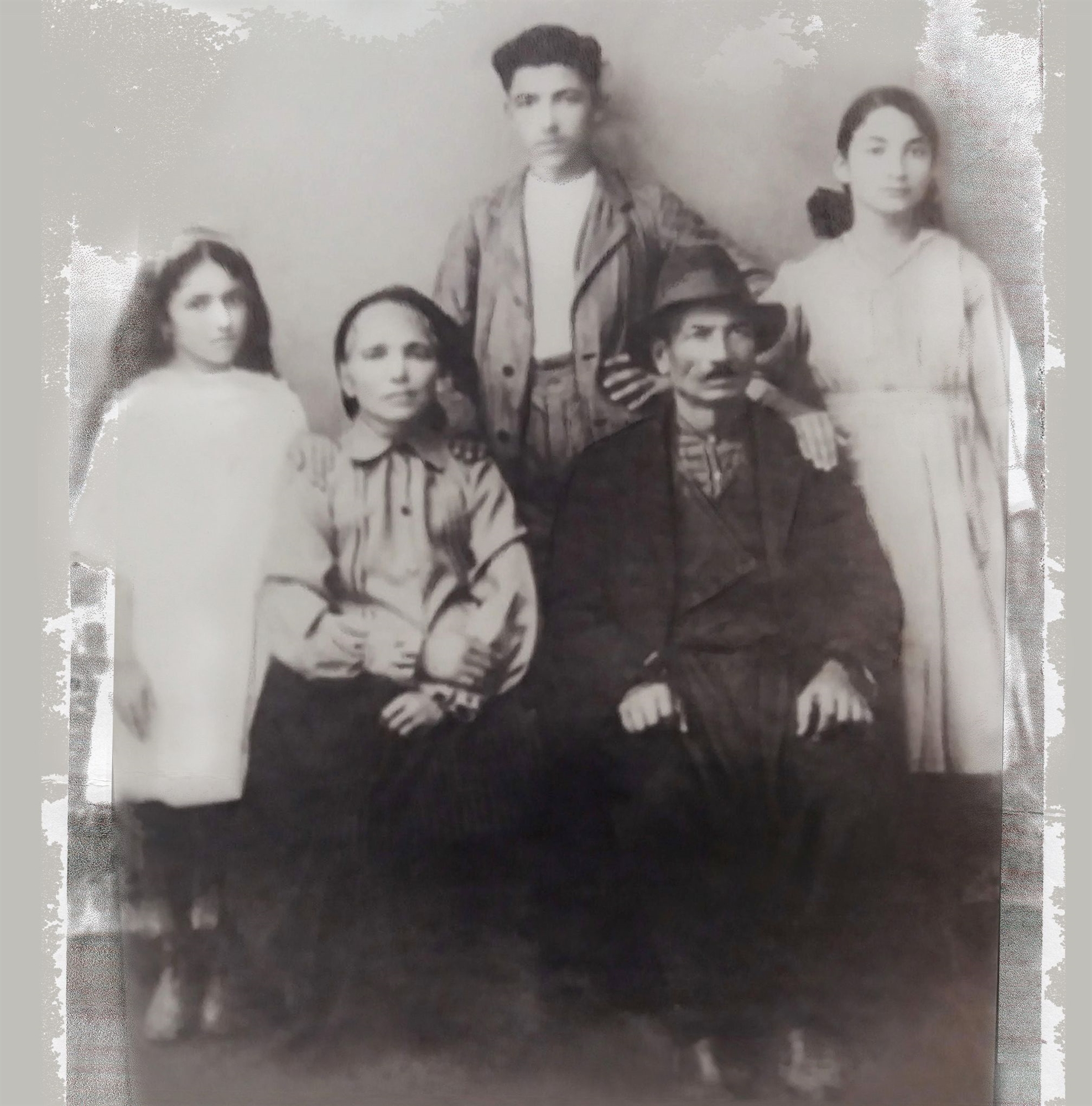
Evidence of the history of existence is already turning gray. Catastrophes, rebirths, oblivion, memories, lies, truth, defeats and victories, betrayals, heroism accompany our daily life, confused or forgotten, all together. Tragedy and catharsis are ahead of us night and day. We are here too. Living descendants of distant events and people who sowed us in a row and gave birth to us with hope. We are a continuation of the thread, knots and weaves, their future that became the present before it too becomes the past, and the time will come for others to enjoy the glory and sorrow in their lives.
My great-grandfather Angelos Angelakis, wearing a heavy coat, oriental trousers, a western hat and a well-groomed mustache, arrived in Agrinio a century ago, in 1922. He became a refugee with destruction from Ofrinio in Troas in Asia Minor. “Rankioi” – that’s what they called their village there, in the Dardanelles. Next to his wife, grandmother Lengo, as her mother called her. Behind him, with their right hand on his shoulder, their eldest daughter, my grandmother Polyxenia Paidula, her younger sister Kyriakula on the left, and their son Giorgos at the back.
Their eldest son, Yannis, caught up with them and set off for America on the SS Athinai. He reached Long Island, and from there New Jersey, San Bernardino, California. Restaurants, seven children with Amelia, sixteen grandchildren and as many great-grandchildren, we never saw him, but he regularly sent a chest of American clothes and goodies from America until he died in the 77th. Each time, grandmother proudly called all her daughters and grandchildren to choose. Their other son, Laskaris, stayed in Xanthi, also a restaurateur in the center of the old town. He changed his name and from Laskaris, Angelakis became Angelos Laskaris, Emperor.
I often visited the old man, he was retired when I went to study law in Komotini. They met me with my wife and daughter, their house had a front garden, like a grandmother’s, and he, I remember, was covered in roses. “Our house is glad that you came,” they told me, “come again!” We’ve all had it in cooking. And the grandmother was a famous cook, and the daughters got everything for nothing, and the mother-in-law competed in recipes and tastes, even Uncle Angelos, who is now the spitting image of grandfather Angelakis, has his own recipes and all that. with his hand he kisses me every time I go down to him, hunting and fishing, selected fruits and rare and excellent mezeklik.
Giorgos Angelakis, who is standing behind there, became a tobacco merchant, but before he had time to start a family, he was killed first in alphabetical order of 120 executed by the Germans and their accomplices in the pen of Agia Triada in April 1944. Since then, his wife, aunt Katina and Grandmother Polyxenia lit a candle every Good Friday in memory of him, stained by the bitterness of wars and occupation. But how did he manage, not forgetting all this, eradication, destruction, wars, alienation and poverty, to take root again and reap joy. Eight children, eighteen grandchildren, and may we all always be so good and have fun with her!
We personally continue in threads, knots and weaves, their future becoming present before it too becomes past.
The embrace of happiness, her refugee home, the art of living and her yearning that can and does change everything. Suffering and unhappiness never disappear for long. Only their names and dates change. The essence of man remains the same and unchanged in every age. Along with progress, prosperity and comfort, wars again and again, wealth and poverty together, abundance and violence, fraud and extortion, expansionist barbarism preys on us insatiably. Unacceptable views, unrepentant opinions, misguided followers, intolerance and unsystematic disinformation, fog of inaccessibility, difficult to keep the course and steering.

A lesson is life for everyone, but when and who will learn it, no one can tell us. Every monk will understand that he can. Here we will be until then, all together, good and bad, and we, and others, and all those who are hostile around us and do not like each other. We want – we do not want, life is a relationship with all this, with what we choose and with what has chosen us. Human essence is defined by actions, overt and covert, and people, present and absent.
Without them, we wouldn’t be here. I watch them posing together for a photo, a tribute to the times. They look ahead without a smile, the lens, their present, future, serious, present both in difficulty and in respite, proud, beautiful, well-dressed – I see bows and ribbons tied in the hair of Kyriakula and grandmother – and so silent, as they are printed on paper, they are now also looking at us.
My mother asked me to give my grandfather his tassi, which he used to drink water, and a short wooden cane, on which Angelakis relied in the last years of his life. I still have them. I left the cane on the mountain, where it would be more useful, and next to me lies her tangerine tassi, worn, but fragrant with flowers.
* Mr Christos Bokoros is an artist.
Source: Kathimerini
James Springer is a renowned author and opinion writer, known for his bold and thought-provoking articles on a wide range of topics. He currently works as a writer at 247 news reel, where he uses his unique voice and sharp wit to offer fresh perspectives on current events. His articles are widely read and shared and has earned him a reputation as a talented and insightful writer.